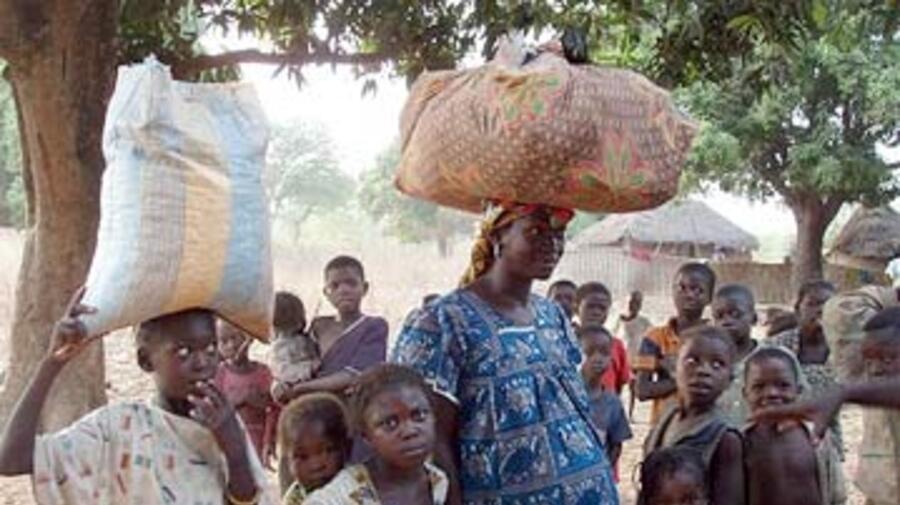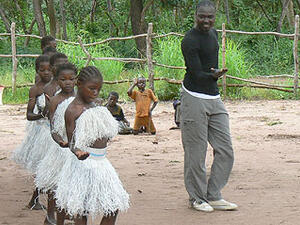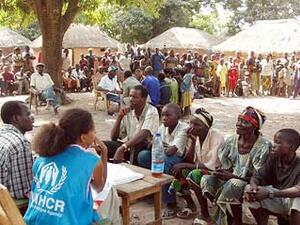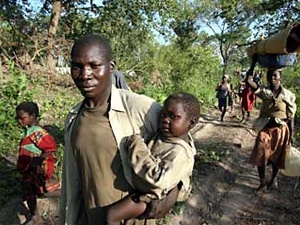CAR refugees fleeing lawlessness and violence cross into southern Chad
CAR refugees fleeing lawlessness and violence cross into southern Chad

Refugees arrive in Bekoninga, south Chad, after fleeing fighting in northern Central African Republic.
BEKONINGA, southern Chad, Feb. 17 (UNHCR) - A fresh influx of more than 2,800 refugees from the Central African Republic (CAR) crossed over into southern Chad this week, fleeing violent attacks by bandits, armed rebels and security forces in the lawless northern part of the country.
"Government forces surrounded our village in Bemal," says Emile, a recent arrival in south Chad. "I don't know how many of them. It happened during broad daylight, in the afternoon. They stole my cattle, four bulls, and broke the door of our house. We did not have any choice but to flee."
The refugees claim that recent attacks on their villages forced them to flee, leaving everything behind. Some refugees told UNHCR they had been attacked by bandits ("coupeurs de route"), while others say they were victims of violent attacks by armed rebels and/or the army, UNHCR spokesman Ron Redmond told journalists on Friday.
Refugees also reported that civilians have been killed in the attacks. Chadian authorities say that since Sunday 12 February, at least 50 civilians have been killed. Six people who were injured during the attacks in CAR have been brought to hospitals in Goré and Bongor towns in southern Chad for treatment.
"There has been a significant increase in CAR refugees crossing into Chad since the beginning of the year, with some 4,300 crossing since January, and 3,785 seeking refuge in February alone," said Redmond.
Refugees are crossing the border at a steady rate of around 100 a day and are coming from northern CAR villages including from Bepikasse, Bemal, Bossangoa, Bedoro, Beogobo and Bekia. They are initially finding refuge in Békoninga, a Chadian village of 600 inhabitants located only 500 metres from the CAR border.
"Living conditions are extremely difficult in the village and at the border," said Redmond.
Hundreds of refugees are now living and sleeping under mango trees in Békoninga, and have so far survived on the food they were able to bring with them or the generosity of the local population.
"I'm now forced to sleep under a mango tree with my wife and my two children with nothing but a simple mat and no blankets," says Emile, still in shock after witnessing the killing of two people from his village in the Central African Republic.
Refugees have attached their few belongings such as mats, pots and pans, to tree branches. Most of them are still wearing the same clothes they had when they fled the fighting, as there was no time to even grab personal belongings.
"The water situation in Békoninga is also of deep concern as the village only has one well, which is not enough for the local population and the refugees," said Redmond. "As a result, some refugees have no option but to drink water from a nearby swamp."
UNHCR started registering the new arrivals in Békoninga last Sunday. By Thursday 16 Feb. some 300 refugees had been registered and planning was underway to transfer them to Gondje refugee camp, located 12 km north of Goré, the main town in southern Chad. Gondje refugee camp was opened in December last year in order both to decongest the nearby overcrowded Amboko camp and to shelter some of the 15,000 refugees who have arrived in southern Chad after fleeing fighting in CAR during the summer of 2005.
"The new refugee influx is creating an enormous strain on the already limited financial resources available for UNHCR's operation in southern Chad," said Redmond.
The refugee agency is sending 700 tents from its emergency stockpile in N'Djamena to provide shelter for the new arrivals. Kitchen sets and mats are also scheduled to be sent shortly.
The new influx has also put food stocks for refugees in southern Chad under pressure. The UN refugee agency and the World Food Programme are working together to avoid any reduction in food rations for the refugees.
In addition to this new influx of 2,800 in Békoninga, Chadian local authorities also told UNHCR that a group of 2,000 refugees CAR may have arrived at the Bekan border point. UNHCR teams are now trying to confirm this information.
Some 43,000 CAR refugees live in three camps in southern Chad - Yaroungou, Amboko and Gondje. Most of them arrived in 2003. Chad is also hosting more than 200,000 refugees from Darfur in 12 UNHCR-run refugee camps in eastern Chad.
By Ginette Le Breton in Békoninga, southern Chad





